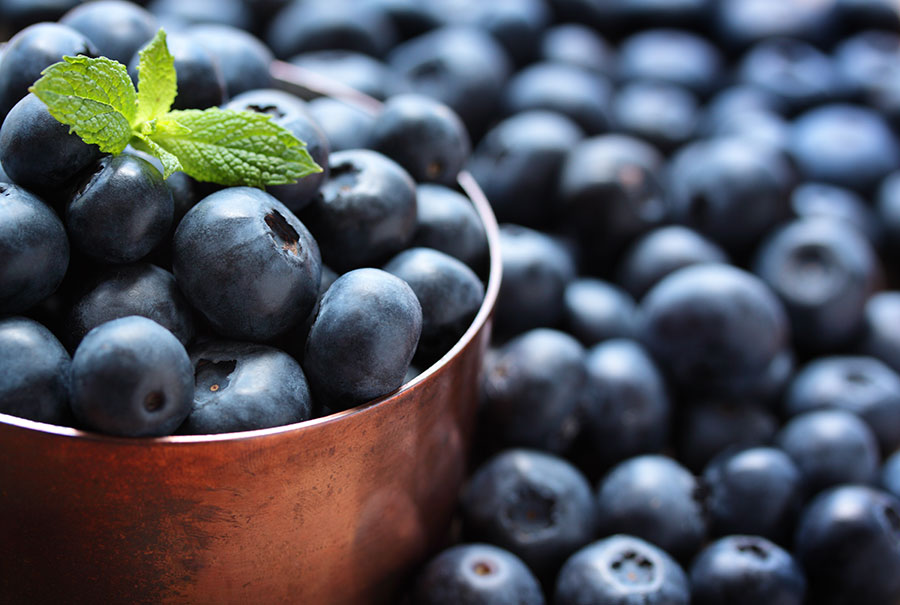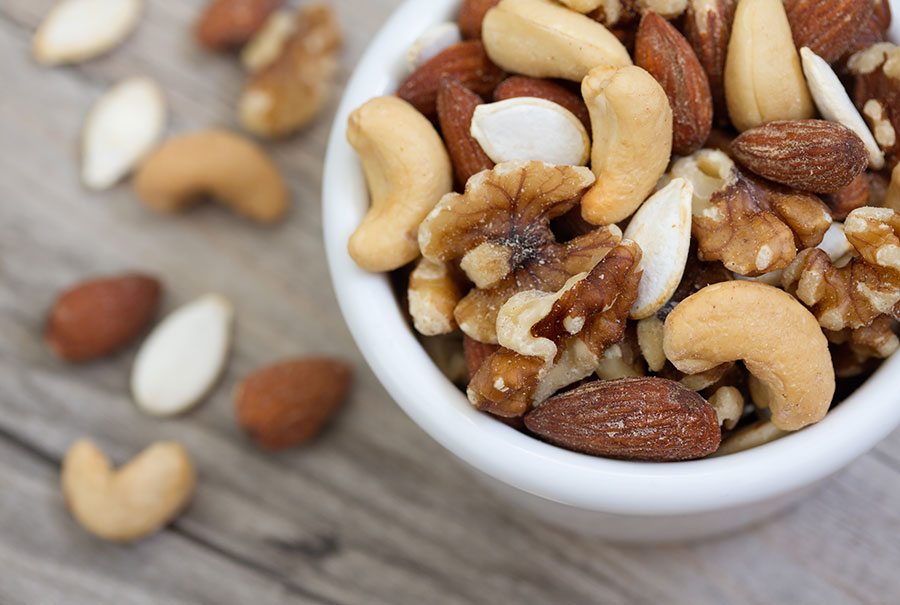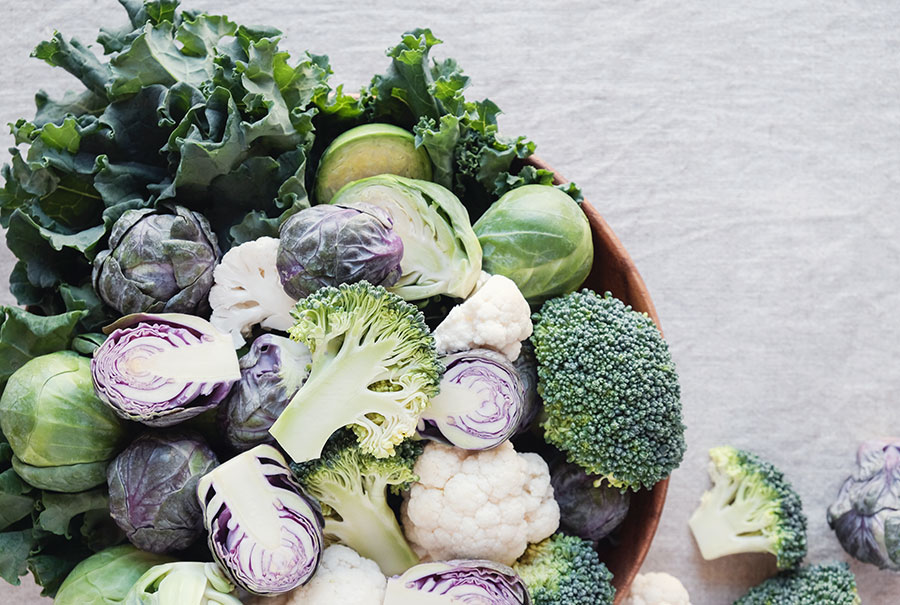Surprise – most foods for heart health come from living things without hearts! That is, only one item on our list of the nine most heart-healthy foods is an animal and the rest are plant sources. Vegetarians, omnivores and paleo-lovers alike can all protect their hearts by including suitable foods from the following list more often.

BLUEBERRIES
These fruit gems contain high levels of polyphenols1,2 and have multiple cardiovascular benefits including anti-inflammation,1 lowering blood pressure,2 regulating cholesterol oxidation2 and accumulation,1 reducing oxidative stress,1,2 and improving vascular function.1 Consumption of blueberries is associated with cardiovascular disease prevention1 and cardiovascular risk factor reduction.2

NUTS
The omega-3 fatty acid present in nuts, alpha-linolenic acid, may reduce cardiovascular disease risk and atherosclerotic plaque formation by changing vascular inflammation and improving endothelial dysfunction3 (the health of the vascular wall). In a nearly 5 year-long study those assigned to a Mediterranean diet supplemented with nuts (or extra-virgin olive oil) had a lower incidence of major cardiovascular events than those assigned to a reduced-fat diet.4

BEANS
Dietary fiber is known to help protect against cardiovascular disease.5 Legumes (including beans, peas, and lentils) are excellent sources of soluble fiber — the kind that can lower your “bad” LDL cholesterol.6 In a multi-country study, cardiometabolic risk (metabolic syndrome, inflammation, and obesity) was inversely associated with dietary fiber intake.5 Benefits are most pronounced with bean intake upwards of 4 times per week.

LEAFY GREEN VEGETABLES
Intake of leafy green vegetables may confer strong cardiovascular health benefits7. Researchers noted that, “Increasing vegetable intake, with a focus on consuming leafy green and cruciferous vegetables may provide the greatest cardiovascular health benefits.”7 A few studies showed that the greatest cardiovascular benefits were observed at intakes greater than 120 g/day [about 2 cups] for leafy green vegetables.7 Spinach, kale, collard greens, mustard greens, and chard are well-known leafy green veggies.

AVOCADOS
These fatty fruits contain beneficial monounsaturated fats (as well as polyphenols, carotenoids, vitamin E, phytosterols, and squalene) which can lower your LDL cholesterol. 6,8 Avocados seem to help prevent chronic inflammation that makes atherosclerosis, the hardening of artery walls, worse.6 They also inhibit platelet aggregation and help prevent thrombus formation. 8

CRUCIFEROUS VEGETABLES
Evidence supports the notion that cruciferous vegetables promote strong cardiovascular health7. Researchers noted that, “Increasing vegetable intake, with a focus on consuming leafy green and cruciferous vegetables may provide the greatest cardiovascular health benefits.”7 A few studies showed that the greatest cardiovascular benefits were observed at intakes of greater than 200 g/day [about a cup] for cruciferous vegetables.7 Brussel sprouts, cabbage, cauliflower, broccoli, and bok choy are well known cruciferous veggies.

OLIVE OIL
Extra-virgin olive oil contains minor antioxidant compounds9 and a lot of monounsaturated fat. Consuming extra virgin olive oil augments the anti-inflammatory effect of HDL, may repress atherosclerotic inflammatory genes, and helps retain anti-atherogenic activity with advancing age.9 In a nearly 5 year-long study those assigned to a Mediterranean diet supplemented with extra-virgin olive oil (or nuts) had a lower incidence of major cardiovascular events than those assigned to a reduced-fat diet.4

SALMON
Fatty fish such as salmon are rich in long chain omega-3 polyunsaturated fatty acids (LCn-3PUFA) which have anti-clotting6 and anti-inflammatory effects and help lower triglycerides,6 a fat implicated in heart disease. Though not all studies demonstrate cardio-protective effects of LCn-3PUFA, it may be that omega-3‘s role in cardiovascular disease prevention may be dampened by high intake of omega-6 fats. Within a Mediterranean diet (low saturated fat), high omega-3 fat consumption is cardio-protective.
REFERENCES:
- Preventionof Atherosclerosis by Berries: The Case of Blueberries. Wu X, et al. Journal of Agricultural and Food Chemistry. 2018 Sep 5;66(35):9172-9188. doi: 10.1021/acs.jafc.8b03201. Epub 2018 Aug 21.
- Research Backs Blueberries’ Heart Benefit. Tufts University Health & Nutrition Newsletter, November 2010, Accessed 12/17/2018.
- Acute effects of diets rich in almonds and walnuts on endothelial function. Bhardwaj R, et al. Indian Heart Journal 2018 Jul – Aug;70(4):497-501. doi: 10.1016/j.ihj.2018.01.030. Epub 2018 Feb 1.
- Primary Prevention of Cardiovascular Disease with a Mediterranean Diet Supplemented with Extra-Virgin Olive Oil or Nuts. Estruch R et al. New England Journal of Medicine 2018 Jun 21;378(25):e34. doi: 10.1056/NEJMoa1800389. Epub 2018 Jun 13.
- The Association of Dietary Fiber Intake with Cardiometabolic Risk in Four Countries across the Epidemiologic Transition. Lie L, et al. Nutrients. 2018 May 16;10(5). pii: E628. doi: 10.3390/nu10050628.
- Top 11 Heart-Healthy Foods. Kerri-Ann Jennings. WebMD.com Accessed 12/17/2017
- Cardiovascular Health Benefits of Specific Vegetable Types: A Narrative Review Lauren C. Blekkenhorst et al. Nutrients. 2018 May; 10(5): 595. Published online 2018 May 11. doi: [10.3390/nu10050595]
- Fruits for Prevention and Treatment of Cardiovascular Diseases. Cai-Ning Zhao, et al. Nutrients. 2017 Jun; 9(6): 598. Published online 2017 Jun 13. doi: 10.3390/nu9060598
- Olive Oil and the Hallmarks of Aging. L Fernández del Río, et al. Molecules2016, 21 (2), 163.
- Contribution of Red Wine Consumption to Human Health Protection. Lukas Snopek, et al. 2018 Jul; 23(7): 1684. Published online 2018 Jul 11. doi: [10.3390/molecules23071684]
Recommended Reading
LA Fitness 4th of July and Canada Hours 2022
LA Fitness will be open for Independence Day and Canada Day! Modified clubs hours are below!Holiday Hours (U.S.) Monday, July 4th: 8AM - 4PM Tuesday, July 5th: Normal Hours Holiday Hours (Canada) Friday, July 1st: 8AM - 4PM Saturday, July 2nd: Normal Hours ...
LA Fitness Holiday Hours 2021
LA Fitness will be open for parts of the Holiday Season! Modified clubs hours are below!Holiday Hours (U.S.) Friday, December 24th: 8AM - Noon Saturday, December 25th: Closed Friday, December 31st: 8AM - 6PM Saturday, January 1st: 8AM - 6PM Holiday Hours...
3 Year Anniversary – Living Healthy Podcast Update
Today is the 3rd Anniversary of the Living Healthy Podcast, presented by LA Fitness. Hi everyone! I just wanted to give you a quick update on what is going on with the show. We are trying to plan out 3 LIVE podcast episodes covering Exercise, Nutrition, and Sleep...


